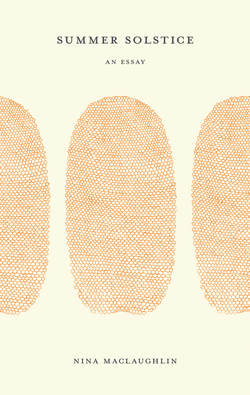Читать книгу Summer Solstice - Nina MacLaughlin - Страница 7
На сайте Литреса книга снята с продажи.
In Summer We’re Reborn
ОглавлениеWe start in the stars and move to the womb, which is to say water, which is to say swimming, which is the best part of summer.
We’ll ease in. On the dawn of the summer solstice, rouse yourself from bed and head to the lawn or the field or the garden, kneel in the grass or the mulch, and with palms open, touch the grass or leaves or petals, get the damp on your hands, and put the wetness to your face. Power lives in the solstice dew—it gives youth, beauty, health, new glow. Especially true for maidens, it’s said, but all can take part. Take a dew bath in the solstice dawn. It makes sense somehow with the residual self-evidence of childhood—oh, of course the solstice dew holds magic—like a belief in fairies or demons. There’s a lot in this world we can’t see.
Dew is the damp left behind as day is born out of night, “a child of moon and air,” according to the lyric poet Alkman, writing in the seventh century b.c. Air and moon mingle and the result is a bead on the grass blade. Haikuist Kobayashi Issa writes:
The world of dew
is the world of dew.
And yet, and yet—
Here, the dash is the haiku’s Rorschach test—how does your brain fill in what’s next? This world is real, but it won’t last long. This world exists and yet—we can’t enter it, and yet—we live right in it. And yet the world of dew is not a world at all. And yet what is a world and what are we doing? What now? On the solstice, a baptism with these beads brings renewal, purification, a whole new life. We’re made fresh and ready. When Christianity took sway over paganism, there came a midsummer day, the midpoint between planting and harvest, known as Saint John’s Eve. It marks the feast day of Saint John the Baptist, he who dipped people in the river and washed them of their sin, he who rebirthed people in the water.
There’s a river in Eastern Europe. Imagine yourself on the shore, holding a crown you’ve made of flowers, and imagine the person you love, or desire, or feel curious to kiss, is on the other side of the river with crowds of people. You are with crowds of people on your side of the shore, and you place the crown onto the water and watch it float across the river to see who receives it on the other side. Imagine your hope that it’s the one person you want. Flowers floating across the river to see if you find good luck in love—this is another solstice tradition, another upping of the chances that love—and new lives—might be born.
Summer’s when the world gets born again. Tove Jansson, in The Summer Book, a novel luminous as a piece of beach glass, writes about a grandmother and granddaughter who live together on an island in Norway, and of the midsummer celebrations there. The granddaughter starts the day stormy, and the grandmother longs to tell her, “I understand how awful it is here. Here you come, headlong into a tight little group of people who have always lived together, who have the habit of moving around each other on land they know and own and understand.” She’s talking about arriving on the island, but she might as well be talking about arriving into life, the violent expelling from our original swim, our unprotected entry, wholly vulnerable, into a clutch of others who’ve been around, who have their habits, ways, and limits. Everything, even breath, is new.
